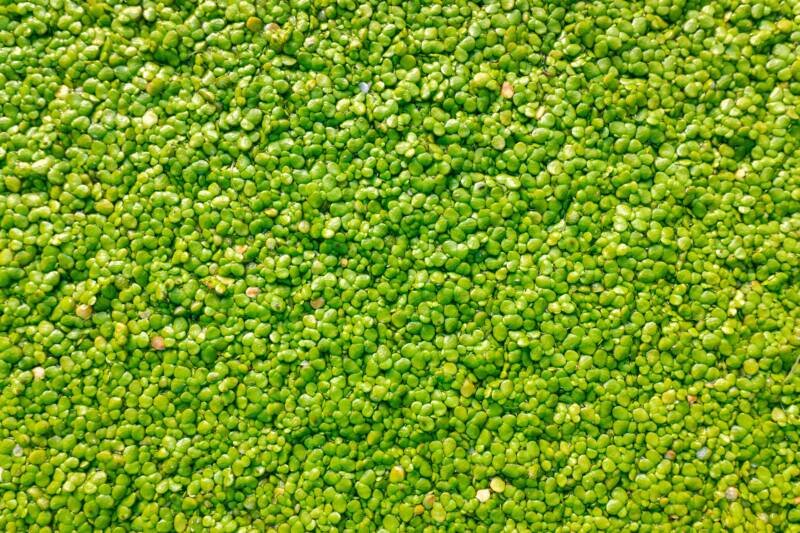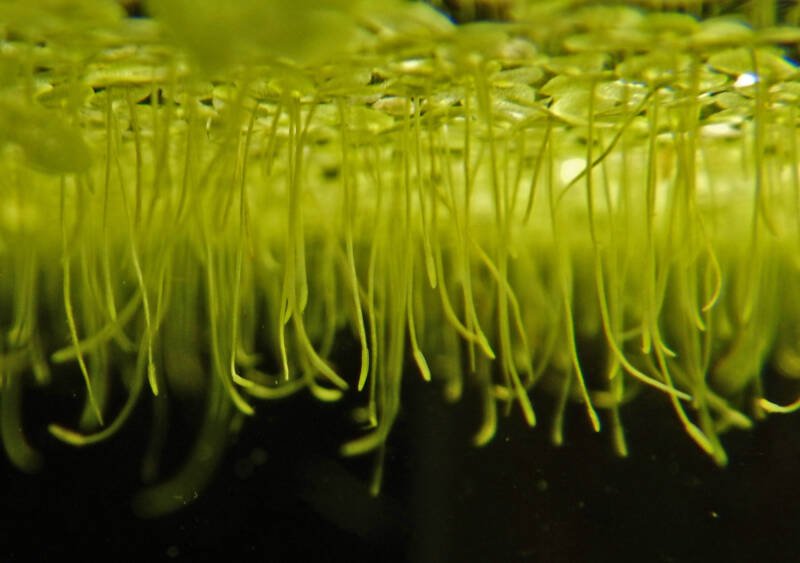Duckweed is an incredibly hardy aquarium plant.
Similar to its quick propagation, it has spread through the aquatic community and become a staple plant. It’s visually pleasing, easy to care for, and is one of the best water purifying plants available.

Arguably no other commercially available plant in the aquatic trade is as easy to grow and hard to kill as duckweed.
Though it comes with its own unique set of challenges as a result of these characteristics, duckweed is a popular choice for both beginner and experienced aquarists.
It can help keep the tank free of chemicals and algae and provides ample surface cover for fish.
In this article
Appearance and Propagation
Duckweed is also commonly known as water lens and bayroot, and less commonly known by its scientific name Lemnaceae and Lemna minor.
It is a floating plant with small, oval-shaped leaves (also called fronds or pods) that sit just above the water’s surface, while its roots dangle below.
It has the distinction of being one of the smallest flowering plants. From the surface, it looks like a miniature lily pad when it blooms.
The leaf surface is a vibrant green color that may appear dark green or even purple underneath, while the roots are a dull yellow or white.
This plant reproduces through asexual budding, which is just one of the reasons why it spreads so quickly. It will grow in dense colonies that can either greatly benefit or hurt the aquarium.
Natural Habitat and Aquarium Use

Duckweed can be found in nearly every body of water, but only thrives in aquatic environments that have low currents. Moderate to strong water movement displaces this plant and makes it hard to propagate.
In completely stagnant areas, duckweed has been known to cover the entire surface of the water, creating a thick blanket that completely blocks light.
Though it does have drawbacks, duckweed is generally valued in the aquarium trade.
It is an easy plant to grow and is aesthetically pleasing. Because of its quick propagation and strength in numbers, it serves as one of the best plant water purifiers available.
It also has the added benefit of naturally reducing algae growth.
Duckweed limits the amount of light that can reach inside the tank, while its roots quickly soak up nutrients in the water. This leaves almost nothing for algae to feed on.
Basic Aquarium Setup
Because it doesn’t mind stagnant water and can find and soak up any nutrients in the water, this plant is suitable for a wide range of aquariums.
It does well in both nano tanks and larger aquascapes. However, tank sizes present a bit of a conundrum where duckweed is involved.
Larger tanks have more stable water parameters and the sheer number of gallons means more nutrients are available. But duckweed can quickly become unmanageable if allowed to freely propagate in such a large space.
To ensure duckweed thrives while still maintaining control over it, it’s important to make sure your aquarium has the equipment listed below.
Optional Equipment
Duckweed is one of the hardiest plants in the aquarium trade. Besides preferring minimal water movement, it will happily and quickly spread under almost any conditions.
- Filtration: Duckweed doesn’t do well in environments with a high current or lots of water movement. Because of this, filter outtakes may need to be altered so that they are not as powerful or are more dispersed.
- Heating: As long as your water is freezing cold or scorching hot, this plant will gladly grow and spread. It tolerates everything between the two extremes. However, it does grow more readily in warmer temperatures.
- Lighting: This plant appreciates moderate to high light, but will do well in pretty much any environment, even low-light tanks. This makes it a great choice for “low-tech” setups that stick to the basics.
- Carbon Dioxide: Like most aquarium plants, duckweed appreciates regular CO2 doses. However, it will also grow fine without it. For aquarists that don’t want to invest in CO2 setups, which can be costly, this plant will still thrive.
- Containment: It’s best to contain duckweed to a specific area of your aquarium using tubing or some other material that will float on the water’s surface. This is to keep duckweed from overrunning the aquarium.
Essentially, it’s harder to get duckweed NOT to grow. Aquarists would have to put more effort in removing or killing it than they would in allowing it to naturally spread.
This makes it an excellent plant choice for even beginners.
Optional Water Parameters
As stated above, duckweed is incredibly resilient and can thrive in almost any aquarium. Because of this, there aren’t many specific parameters to set.
- pH Range: This plant can be added to all types of aquariums, no matter if the fish prefer acidic, basic, or neutral water.
- Temperature: Duckweed can grow in warmer or colder temperatures, which is why it makes an excellent aquarium or pond plant. It’s just as happy outdoors as it is in a temperature-controlled tank.
- Hardness: No matter the dGH, this aquarium plant will likely thrive and spread regardless.
One of the greatest benefits of this plant is that it’s an efficient and effective water purifier. It’s easier to keep lower levels of ammonia, nitrites, and nitrates as a result.
Though weekly water changes are still required, duckweed does an admirable job of keeping a stable and high water quality.
Tank Mates
Duckweed does well in almost any environment, so it’s no surprise that it also does well with almost every type of fish and tank inhabitant.
Fish that inhabit the middle and upper areas of the tank may enjoy its shade and play in its roots, while bottom-dwelling fish will appreciate the cover it provides.
Bettas and other labyrinth fish that must regularly return to the surface for air may appreciate the interaction and enrichment it provides.
Still other fish will appreciate duckweed as a food source, as it’s packed with nutrients and protein. Herbivores will quickly incorporate this plant into their diet if its available and will devour leaves and roots alike.
Fish that will devour duckweed include:
All of the fish above will use duckweed as a primary or supplemental dietary source. This can be useful if duckweed is taking over your aquarium or you need an affordable food source.
However, this can be problematic if you want to grow duckweed or keep it as part of your live plant setup.
Common Issues
This plant propagates quickly, especially in tanks with little to no water movement. This is usually a benefit, but aquarists must be careful not to let this plant cover the entire water surface.
When duckweed overruns the surface of a contained body of water, it leads to oxygen deprivation. In turn, this causes large-scale deaths for other tank inhabitants.
Another issue caused by its quick spread is that duckweed can be hard to remove from an aquarium once introduced.
Many owners have tried to clear out duckweed from the tank, only to find in back in full force a few days later. It clings to everything at surface-level in the aquarium and often infiltrates filters, hidden compartments, and other equipment spaces.
Its well-liked ability to reduce algae can also backfire.
It’s true that duckweed reduces the amount of light and nutrients in the aquarium, thus reducing algae’s ability to grow. However, this can also reduce the ability of other, desired plants to grow.
Plants that draw their nutrients from the water instead of the substrate may be particularly hard-hit depending on the amount of duckweed present.
Adding Duckweed to Your Aquarium
Duckweed is one of the easiest plants to grow in aquariums or ponds and is also one of the hardiest.
It reduces harmful waste and chemicals, serves as a food source, and generally provides shades and spawning spaces.
It’s a plant-of-all-trades that any aquarist can keep, whether they’re beginners or experienced hobbyists. It does well in all sizes and setups, whether it’s a large tropical tank or a nano cold water aquarium.
Though it can also cause some serious issues depending on its density and spread, duckweed is generally a useful aquarium plant.
Though not bold in appearance or particularly striking, its attractiveness instead sprouts from its steadfast nature.
With duckweed, you can be sure of a plant that’s working as hard as you to keep the aquarium clean and thriving.